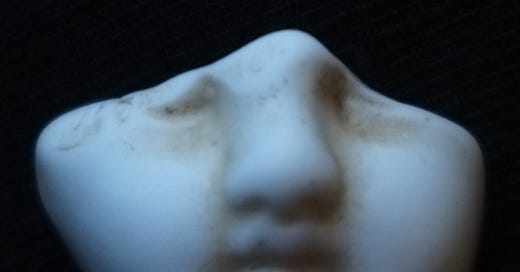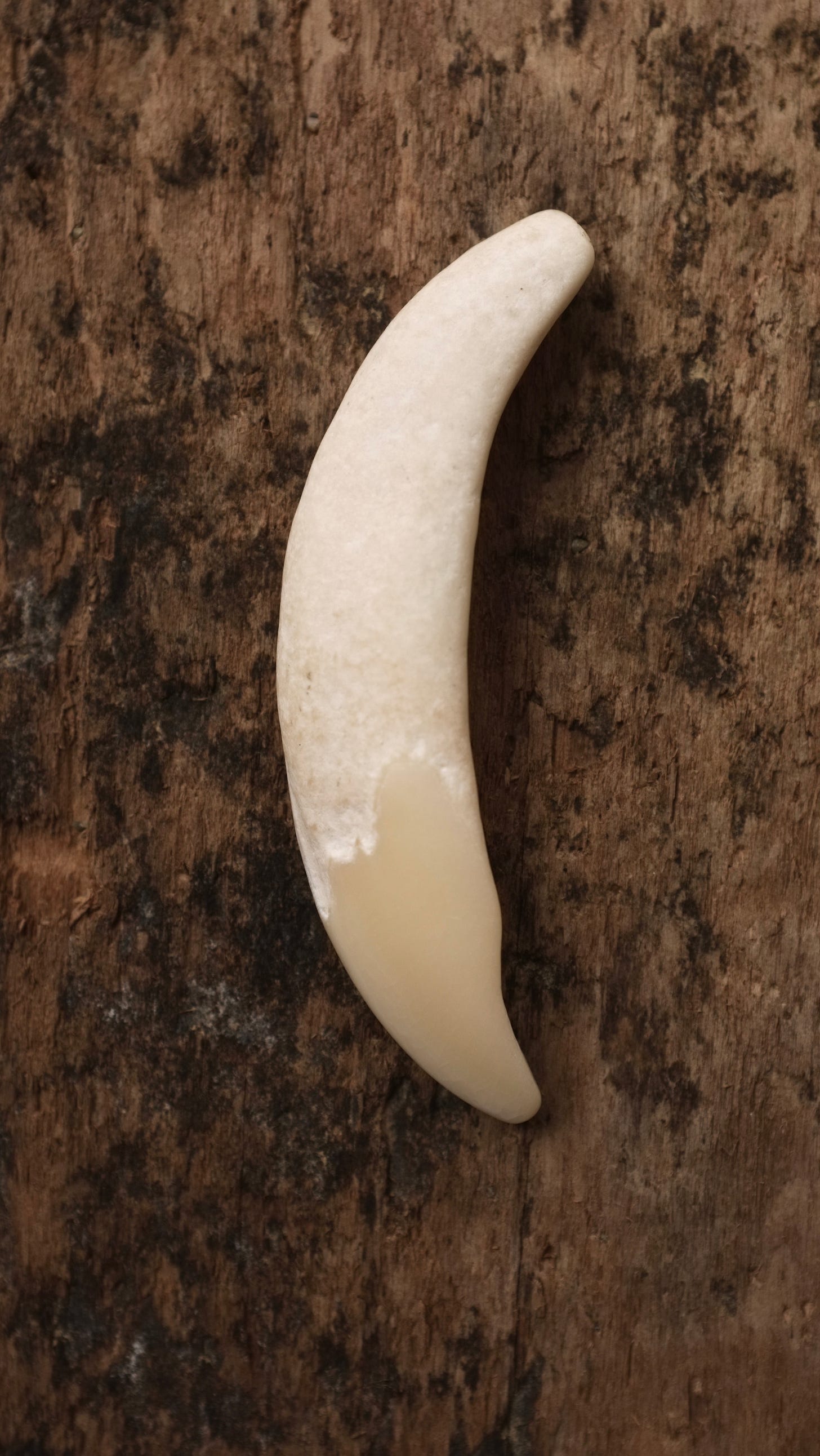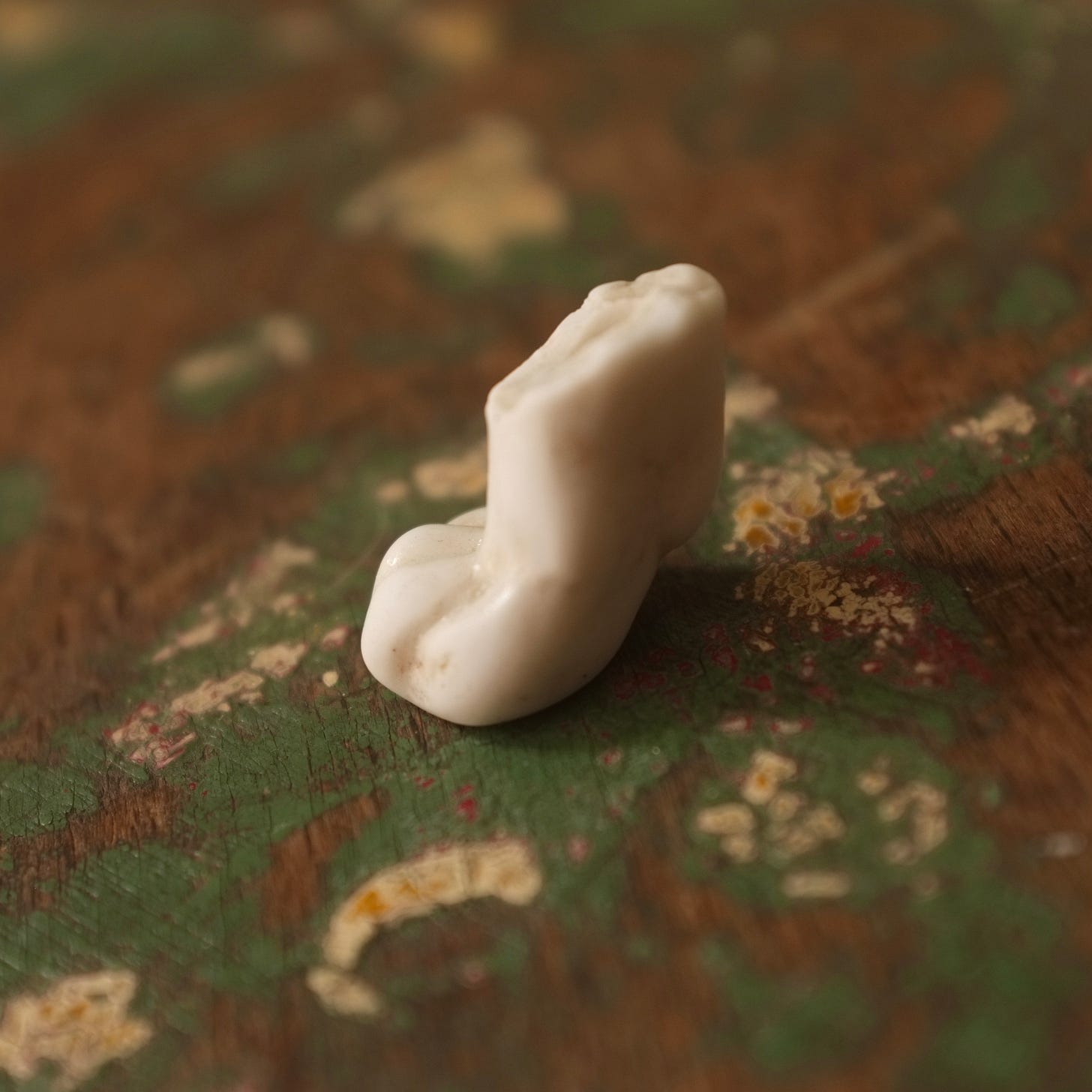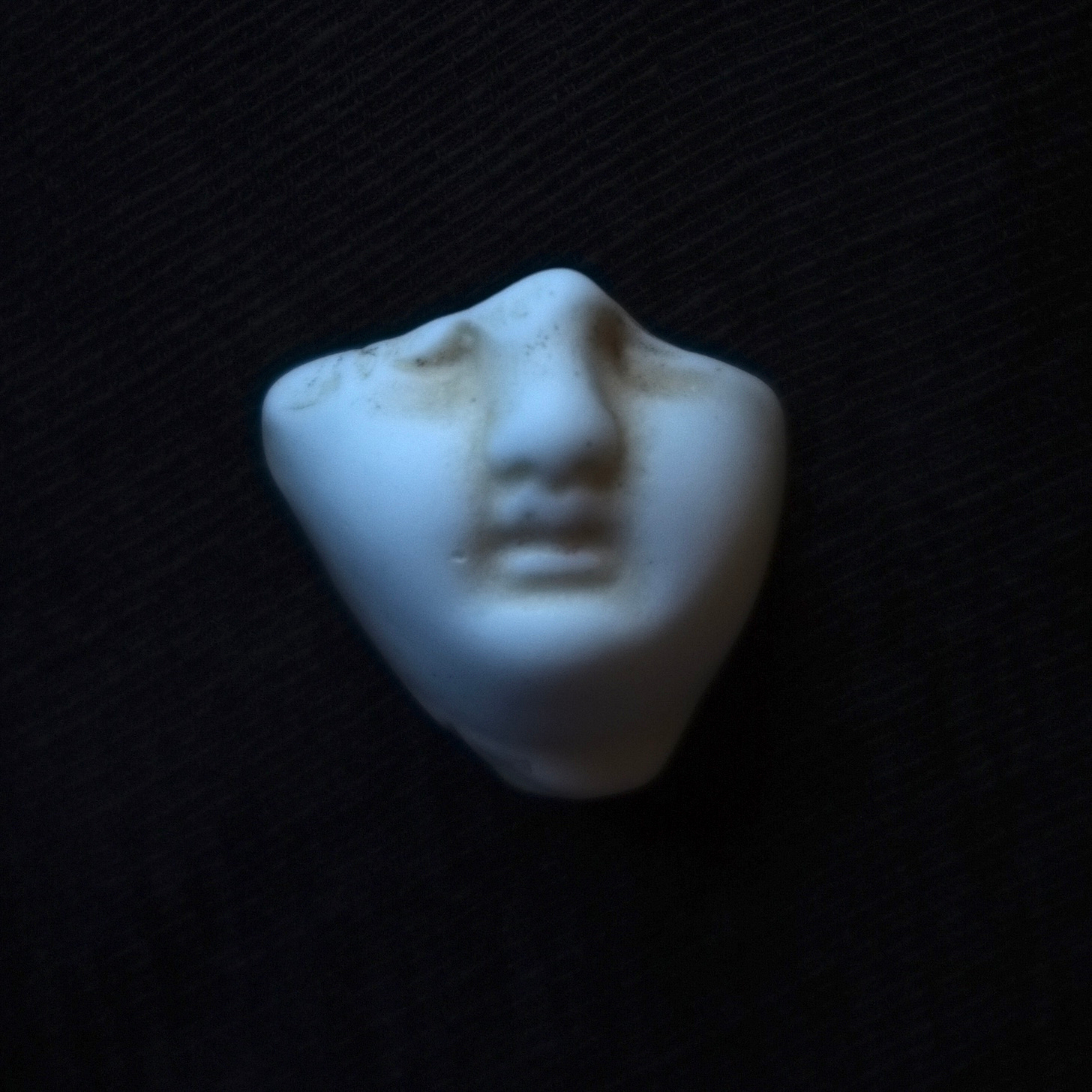Federico García Lorca: “We have said that the duende loves the edge, the wound, and draws close to places where forms fuse in a yearning beyond visible expression…
But it’s impossible for it ever to repeat itself, and it’s important to underscore this. The duende never repeats itself, any more than the waves of the sea do in a storm…”
The beach is like a body made of patterns. The visible pebbles are only the skin.1 Just beneath the skin— the drifts that are today’s seen surface: dry, wet, rain-spotted— are myriads of hidden fragments. I can almost feel them, those sublithic bright jewels. There’s no point in digging for them. I must wait for them to be offered, as if the sea were a server with a tray.
The sea is a great sorter and rearranger of objects, with its alternating forces of wild storm-disruption and patient wave-combing. After the big swells, the beach stones are flipped like a folded omelette. Then, tide by tide, the whole mass is shaken down, sifted, smoothed.2 The ocean doesn’t distinguish natural from unnatural: it grades by size, shape, weight, buoyancy. Certain things end up in certain places, plastic here, ceramic there. Emergent order. Sometimes the sorting is uncanny. I found these two keyboard keys— from different keyboards— less than a foot from each other.
A human-made artefact stands out. Marbles are one of my favourite things to find. (I once dreamed of a beach made entirely of marbles, but it was getting dark, and I couldn’t carry them all.)3 If the marble has been rolling around in the sea for a long time, it is only translucent when wet; as it dries it returns to opacity. Put it in your mouth to renew the wet, the bright. The glass has a whitened crust, so it seems correct that it should taste of salt.4
The things I love most are those that are either most human or most wild— words and / or images imprinted on durable matter, legible across decades or centuries;5 or animal bones and teeth. The beach offers me both.
Skulls that once held a brain, eyes, nose, ears, tongue: a consciousness.6 The lone tooth that tells itself by form:7 what is it made to bite?
On New Year’s Day I got infected with the false magic of the Gregorian calendar, and went out beach-combing looking for something significant;8 but looking’s not like that. Too much intention can jinx it. (The same principle applies in hitch-hiking, op-shopping, meeting people, and finding- desperation impedes the magic. If you get prescriptive, you’re not going to pick anything up. If you get angry, nobody’s going to pick you up. Stay friendly.)
There’s a particular feeling-state that’s most fruitful for finding. A keen receptiveness, suspended between seeking and openness. (In that way finding is like art— the intention, the design, is just a shape that things happen inside of. The plan is necessary, but it’s not the point; intent is just a tool to activate a process, to make space for emergent forms to arise.) The sweet spot is between one thing and another— the margins are alive. Between one state of mind and another, between searching and accepting. Between one element, one world and another— my particular natural habitat, the intertidal zone— between sea and land.
It’s Yin, not Yang. Receiving, accepting, noticing. It’s also something to do with the Commons, those places that are not owned by anyone. In that respect, finding is anarchic.
There is something powerful-magic about things being free. Very-cheap is closely related (the bargain-feeling), but the truest finding-feeling is that of grace— that of the gift. The gift as the fruit of diligence, though, of study, and of application; reward for the tribute of time and attention. Gift-exchange, then: I give to place deep sustained attention. Place rewards me by showing me things, revealing manifestations of itself in the form of artefacts.9
The particular pleasure of finding is in exercising discernment. The world speaks dumb eloquence unceasingly.
Finding is a dialogue between a person and an environment. Deep attention makes the landscape more alive— or rather, the landscape responds to attention like an animal does: by responding, by becoming more itself.
Time + attention + knowledge + the magic ingredient: enough curiosity to bend down and investigate an inexplicable object. (Many times I see things, oftentimes I turn things over, sometimes I pick things up, few times I take things home.)
The unpredictability is what makes it addictive. The surprise. Like fishing: what will emerge from the deeps? What will show itself? Pattern-recognition is what makes us human. Hunting mushrooms: the way they suddenly pop out from the leaf-mulch. Getting your eye in, that’s called. In the process of getting your eye in, distraction— deviating from the scent— is like breaking a spiderweb mid-weave. The correct state of mind takes time to come to. The finding process is solitary, secretive, speechless.10
Finding is also something to do with walking, with being on foot. It is something to do with left-right. (Feet, and therefore brain hemispheres.) Walking a complex surface— relating to the beach with my bootsoles,11 is different from walking a simple surface— the plain concrete of the city (which is nevertheless full of cracks and crevices wherein bios and chaos can shelter and proliferate.12) Foot-knowing, eye-knowing, hand-knowing.
The common places, the forgotten places, the hidden places, the humble places, the hard-to-reach places. Look there.
Losing is the shadow side of finding. Finding helps me to lose better. It’s more a matter of chance than karma, though both losing and finding are matters of carefulness vs. carelessness. Finders keepers, losers weepers. One person’s trash is another’s treasure. But there’s some comfort in knowing someone finds what I lose just as I find what they lose; that the lost item exists somewhere out there in the world, going on with its separate life.13 A person can have temporary (time-based) custody or care of a thing, but the world of things is a ceaseless becoming and unbecoming.
I feel about finding as fisherfolk feel about their fishing spots: secretive. Realistically though, very few people have the time to wander round doing nothing but looking, and ultimately, no one can see through my eyes but me. There’s no shortcut to the ten thousand hours. You can know what rock to stand on, but that doesn’t mean you’ve learned when and where to cast. You can flex knowledge, but the proof of fishing skill is the caught fish.
In writing this, in searching for concrete ways to speak about subtle intuitive processes, I see that writing is another kind of finding. Beyond logic lies magic.
Makara in scorching summer. Scary sun, that made me think of cli-fi novels, that terrifying future sun that people have to hide from until nightfall in derelict buildings. I threw a cloth over my head and stood ankle-deep in the lucid ocean, watching the light split and paint rippling stripes on the stones. Cook’s turban14 and other smaller snails went calmly about their underwater business, uncaring of the giant pink feet in their midst.
Wandering on the piled driftwood logs, I saw something glint white in a dark knothole. An argonaut shell tucked deep. It was like a letter left in a secret mailbox. I extricated it gently, delicately, working out the angles, a kind of backwards spiral. It was large, broken, glinting in the sun, the ripples of its construction running across the bumps of its form, like water rippling across patterned sand. The dimples were full of dark rotten-wood-dust. I took it down to the sea to clean it. Afterwards, holding it in my hands and sitting on the round-pebbled bank, the wind snatched it and threw it down on the stones, and it broke more, into two pieces; so I weighed it down with pebbles and photographed it— blind, exposing by guesswork, due to the dazzling light. I took the photo and left the shell.
Enrique says: “Dear Rosie, this is how I would write you.
A woman visits the shore every afternoon. She collects little shards, buttons, bones, and marbles. Once, she found an alabaster face.
The inert lives for a moment, writhing in fire or water. I asked her if these things came to die in her hands or to start a new life. She said they signal a courtship. She gives her love to the sea and the sea loves her back.”
It’s a constantly changing skin, like a cephalopod’s cromatophores.
The wind does its work, too.
Finding treasure is a recurrent dream-theme.
How do we know how everything tastes? Databanks of baby-science.
Artefacts that tell of their own origins.
Former electrified-meat box.
Sullivan’s axiom: Form follows function.
It was the first day of 2023. Shades of Discordia. Golden apple— Eris— Chaos— etc. But that’s far too much will, wishing for something symbolic to appear— chaos is a slippery beast.
Also in the form of intangible things, but I’m talking here about the tangible.
Singing to yourself is fine, though.
Walt Whitman: “If you want me again look for me under your boot-soles.” Song of Myself 52
Moss, lichen, weeds. City-findings: drugs, money, dropped jewellery.
I feel this most acutely if it’s something I’ve made that’s been lost. A crescent-shaped hairpin, made of mother-of-pearl and ebony, that fell out of someone’s hair on a rollercoaster (my fault: design failure, but I was young.) This ring, which I left in the library bathroom.
Cookia sulcata, a fist-sized turban snail.














